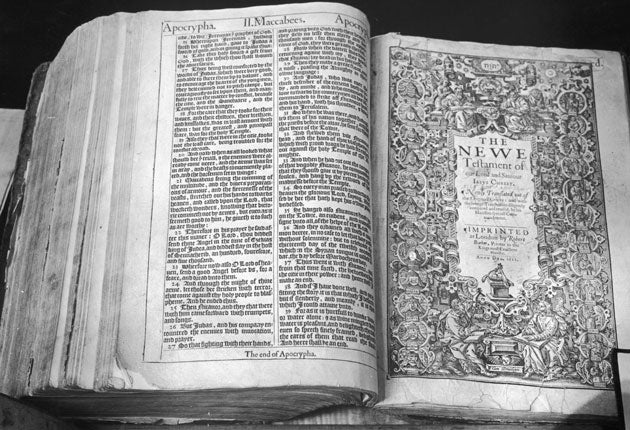The Weekend's TV: Waking the Dead, Sun, BBC1<br/>King James Bible: the Book That Changed the World, Sat, BBC2
Slowly coming back to life

How timely is this – a police unit disbanded because of budget constraints, its members clearly unhappy about the decision, and prepared to make their discontent public.
After this final season of Waking the Dead the officers who currently serve in DS Boyd's cold-case unit will be losing their jobs, although another post has been found for the team's forensic pathologist, Eve, who is going to get a spin-off show of her own called The Body Farm. Appropriately enough, given the planned closure of the Forensic Science Service, it's to be a private enterprise affair to be undertaken by Trevor Eve's production company. Meanwhile, both he and Sue Johnston, who plays the psychological profiler, are a little grumpy about the fact that Waking the Dead is being obliged to close its doors early. They make the point, with some justice, that its viewers have stayed loyal through all eight series so far, though it's something of a mystery to this particularreviewer why that should be. Preposterous doesn't really begin to address the problem.
After a characteristic appetiser of gothic insinuation, involving the sudden death of a sick child and some creepy religiosity from a paediatric nurse (odd, isn't it, how a crucifix has now become the reliable badge of a maniac in popular television), last night's episode properly got down to business with the mystifying decision to second a traumatised detective superintendent to Boyd's basement lair. "She's too young to kick upstairs and she's too high-ranking to bury in traffic," said one of Boyd's seniors. "We want you to put Humpty Dumpty back together again." It seemed an odd way of going about things, given that Boyd himself is widely recognised to be a few chips short of the full shell. Effective, yes, but not exactly famous for his powers of empathy and nurturing. Anyway, in one respect at least Sarah Cavendish seems perfectly qualified for his team. She's stroppy and opinionated and more than willing to pull her weight when it comes to having rows in the corridor with the boss – an important element of the squad's duties.
The mystery involved the disappearance of a prosperous city banker, the sort of crime for which about 50 million people probably had an excellent motive. But the chief figures in the frame here were a spooky couple who'd been stalking the banker dressed in funeral clothes. You don't get a laugh very often in Waking the Dead (or at least not an intentional one), but I defy even the series' soberest fans to have survived without an involuntary snort when this couple's Identikit picture was pasted up on the see-through incident board. It looked like the winning entry in a drawing contest intended to induce nightmares in small children. And they looked even worse when they turned up at the very end – sort of in the flesh – after being discovered in a mummified condition in a derelict paper mill. The episode ended with a canonical example of the far-fetched coincidence that has always been a stock in trade for the series, and which seems to have done nothing to deter its many devoted viewers. Sent to secure the couple's empty home in the middle of the night (why?), a female police constable operating without a partner (why?) surprises a balaclava'd figure, who then douses her in petrol and sets her on fire (why?), so that she can stagger shrieking and flaming into Boyd and his colleagues, who have also chosen this exact moment drive down from London in the dark (why?). If there are answers to these questions they may be revealed tonight, in the second half. Myself, I can live with the enigma.
On Saturday night, Melvyn Bragg made the case for the King James Bible as the second millennium's most influential text. His point was twofold. That the English language would be utterly different without the contributions made to it by Tyndale and the translators of the Authorised Version. And also that the common tongue was revitalised in a way that made it an instrument of liberation and revolution. Bragg's own language was richly and appropriately Biblical: "His Bible was to be the rock upon which he would build his rule," he said of James; "There is wheat as well as chaff in it," he acknowledged, conceding that this was a text that had been used to sanction oppression as well as fight it; "The Bible after 1611 was a river which carried literature in its flow for centuries," he argued, pointing out the dependency of our greatest writers on its cadences and poetry.
If you wanted to argue with his thesis (and that you think it's actually worth bothering I take as evidence of merit), you might want to pick away at the opposition he implied between Enlightenment (science, rationalism, democracy etc) and Scripture. His suggestion was that the latter had given rise to the former, which didn't emerge sui generis but was supported and seeded by the King James Bible. In other words, the Enlightenment had its roots in Scripture. That's obviously true in one sense, but I wonder whether it entirely addresses the question of why the Bible came to be translated in the first place, a democratic and empowering impulse that was applied to religion (and was murderously resisted for many years). Given that the Bible had successfully sustained oppression and slavery for hundreds of years, it seems generous, to say the least, to give it the bulk of the credit for eventually ending it.
t.sutcliffe@independent.co.uk
Subscribe to Independent Premium to bookmark this article
Want to bookmark your favourite articles and stories to read or reference later? Start your Independent Premium subscription today.

Join our commenting forum
Join thought-provoking conversations, follow other Independent readers and see their replies